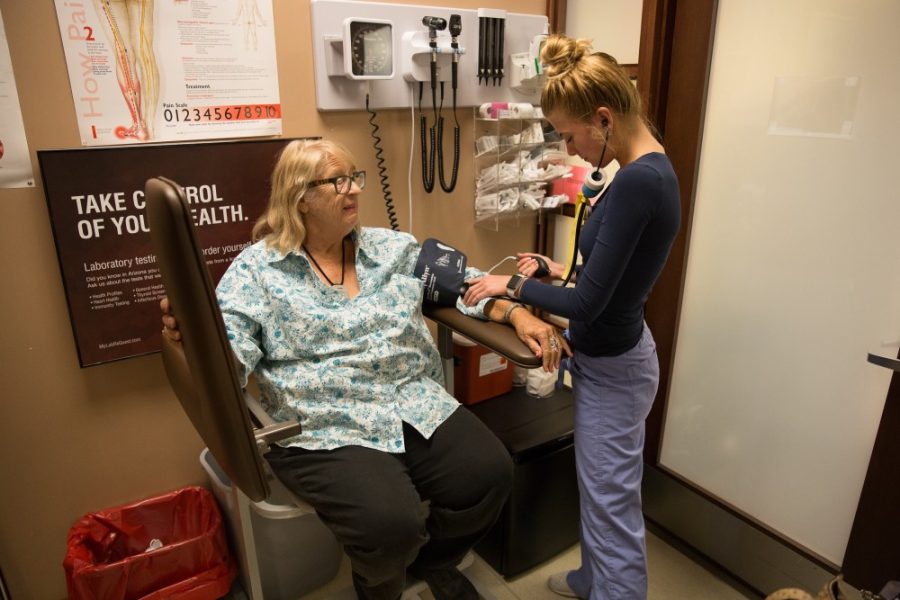The Safeway on 1940 E. Broadway Blvd. now has more to offer than just groceries.
As of August 9, the store has opened a Banner Quick Care clinic to provide different health care services for store customers. Two other clinics in the pilot program have also opened in Chandler and Tempe.
Banner Urgent Care CEO Dr. Rob Rohatsch said the addition of the clinics are part of their goal to move toward a more consumer-driven practice.
“Part of Banner’s philosophy is to really be a consumer-facing health care company,” Rohatsch said. “We want to be where consumers want us—the right person, the right place and the right time.”
Dr. Devin Minior, CMO of Banner Urgent Care Services and Retail, said in an email that the Banner Quick Care clinics are a new way to help patients get the care they need.
“We hope that the BQC’s can be a more convenient option for many patients, and make it easy for them to select the right care, in the right location,” Minior said.
RELATED: Mobile MediCats bring health awareness to homeless
While Rohatsch said having a health clinic in a grocery store could be seen as a little odd, Banner Health is just following a growing trend.
“People have to get comfortable with it,” Rohatsch said. “But banks are doing this, you see Starbucks doing this. Health care across the country is becoming a consumer-driven industry.”
The clinics are walk-ins, intended for minor illness and injuries. They will be open seven days a week according to Rohatsch.
“These clinics are for people with things like bronchitis, sinusitis — the kinds of things that can be handled quickly,” Rohatsch said.
The BQC’s are not able to handle broken bones or serious illnesses, but can help with allergic reactions, colds or flus, coughs, strep throat, sprains and urinary tract infections. They can also provide routine physical exams and vaccinations, according to Rohatsch.
While these illnesses and injuries are typically handled by a primary care provider, Rohatsch said many people don’t have one.
 “We’re filling in a gap in the health care continuum,” Rohatsch said. “Another one of our goals is to help refer patients without a primary care doctor to one.”
“We’re filling in a gap in the health care continuum,” Rohatsch said. “Another one of our goals is to help refer patients without a primary care doctor to one.”
The clinics are intended to be streamlined, efficient and low-cost.
“The charges at the clinics are equal or less than at a primary care doctor, and certainly less than the emergency room,” Rohatsch said.
Accessibility was also a key factor in deciding to partner with Safeway, according to Rohatsch.
“We want to serve communities better, and so we need to be where they are and make sure they have a positive experience,” Rohatsch said. “Grocery stores work in that arena.”
Aside from serving the immediate surrounding community, Rohatsch said Banner is also interested in the student population.
“Lots of students who are away from home… they don’t have their primary care doctor nearby, and they don’t know what to do,” Rohatsch said. “They think their only option is the emergency room, and that’s a terrible place to spend 4 to 5 hours for something minor.”
RELATED: UA professor discusses personalized asthma treatment
A study by the National Center for Biotechnology Information found that from 2006–2009, 10.1 percent of United States emergency department visits were categorized as non-urgent. Furthermore, there are 130.4 million average emergency department visits per year, according to data from the CDC.
Minior said clinics like Banner Quick Care definitely have the ability to reduce the number of patients going to the emergency room with minor injuries.
“As an emergency physician, I think there is a lot of opportunity to take patients who are currently going to the ED for their coughs and colds, and get them seen in a more convenient location, with a lower length of stay and at a lower cost to the patient,” Minior said.
Rohatsch said he hopes to work with the University of Arizona in the future to create a student price plan.
 “We want to make it attractive to students,” Rohatsch said.
“We want to make it attractive to students,” Rohatsch said.
Campus Health, which currently serves the student population, saw 71,043 patients during the 2016-2017 fiscal year, according to information from senior program coordinator Terri West.
It’s unclear how Banner Quick Care clinics could impact Campus Health.
Campus Heath spokespeople were unavailable for comment due to a rush of first-week flu patients.
Rohatsch said that though the BQC’s had only been open for a few weeks, the initial response was positive.
“So far it’s been pretty good,” Rohatsch said. “We’ve seen patients at all the clinics, and folks we’re seeing are delighted to get what they need done while getting a loaf of bread.”
Follow Marissa Heffernan on Twitter









